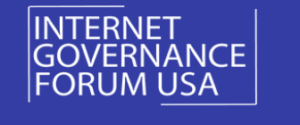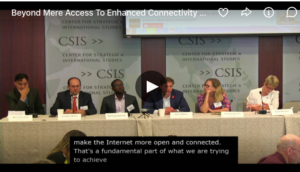The IGF-USA took place online from 22-23 July. Portulans applauds the thought-provoking and timely conversations. This blog responds to the ideas shared during the closing panel, particularly relating to the intersection of Internet governance and innovation readiness. To watch the recorded event, click here.
Moderator Deji Olukotun (Sonos) kicked off the closing panel by diving straight into the deep end, and asking his panelists a provocative question: what would happen to the Internet if humans disappeared?
 Just a few short months ago, this line of thinking would be better suited to the plotline of a popular sci-fi novel. But the pandemic crisis has forced policymakers and technologists alike to more seriously reckon with difficult questions such as these.
Just a few short months ago, this line of thinking would be better suited to the plotline of a popular sci-fi novel. But the pandemic crisis has forced policymakers and technologists alike to more seriously reckon with difficult questions such as these.
In recent months, individuals, firms, and governments have become acutely aware just how much we need the Internet. In fact, in most countries, governance and business is unthinkable without an online connection. As demonstrated by our index, network readiness is essential for countries seeking to reap the benefits of the digital future. For some countries, their survival is dependent on being network-ready: especially in the age of COVID-19. To this end, Professor Laura DeNardis (American University) was quick to note that the pandemic crisis has “laid bare” the fact that perhaps we require the Internet more than it requires us.
The panel turned to the issues of governance that this reality creates. Fabrizio Hochschild (United Nations) noted that the Internet became an essential service too rapidly for international policymakers to keep pace with the necessary norms, institutions, and processes required to uphold Internet access (and meaningful connection, in the words of Sir Tim Berners-Lee) as a public good.
This deficit of good governance has contributed to a growing digital divide and the deferral of digital governance to the private sector. Larry Irving emphasized the consequences of this neglect: though millions of children in the US and worldwide will soon be “returning” to (online) school, federal relief packages have failed to meaningfully address deeply entrenched inequalities in digital tools, Internet access, and content relevance.
Put simply, the Internet and its infrastructure have globalized and exacerbated society’s most dangerous underlying issues: and “we’ve got work to do.” But despite the stormy forecast for Internet governance, Daniel Weitzner (founding director, MIT Internet Policy Research Initiative) encouraged panelists to remember the sunnier days of Internet optimism. And it is true that the Internet has democratized access to information to an unthinkable degree, in most cases resulting in the disruptive innovations that have catalyzed the Fourth Industrial Revolution.
Somewhat ironically, the governance crisis created by the Internet demands solutions enabled by the Internet and harnessed by individuals that cannot hope to live without the Internet. Perhaps the only way out is through, as demonstrated by the impassioned discussion about the trade-off between privacy and human rights in the panelists’ discussion about contact tracing (and Weitzner’s introduction of MIT’s privacy-first contact tracing efforts).
Moving away from the present, Olukuton asked the panelists what they thought the next few years of Internet governance will look like? Hochschild voiced some optimism, and answered that the shared pandemic crisis has created newfound energy for digital cooperation: “the world will come to its senses [and realize that] global challenges can only be solved by global cooperation.”
Irving was decidedly more pessimistic, noting that on our current trajectory, things will get much worse before they get better. The Internet’s “merchant kings” will reluctantly give up their online turf. And as DeNardis stated, we’re currently paying the price for a decades-long defective relationship between governments and the Internet. Panelists shared their insights on the role and responsibilities of voter technology in electoral processes, which are often rendered dysfunctional precisely because of governmental oversight of tech governance (for more on this, the Center for Democracy and Technology has great resources).

Weitzner estimated that it will take a quarter of a century for our regulatory structures to catch up with how much has changed in Internet governance, both online and offline (the Network Readiness Index is a helpful tool to measure a country’s performance in relevant Governance sub-indicators, such as the ICT regulatory environment and rule of law). Until appropriate regulation is designed by policymakers and private sector leaders, and implemented in the normative and institutional ecosystems of the Internet, data engineers will embody a type of “priesthood” as the arbiters of visibility, equity, and equality in digital spaces.
The panelists seemed to converge on one emphatic point: the Internet is a public good. If we do not improve governance, including the regulation of big platforms and core technologies, like AI, we risk creating a “splinternet” of different types of connections that favor only the most privileged. To use Hochschild’s words, we cannot be the generation that lost the promise of this revolutionary tool.



